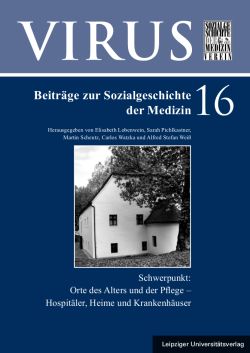Christina Vanja
S. 111 - 125
doi:
10.1553/virus16s111
doi:
10.1553/virus16s111
Abstract:
High Hospitals were established in three disbanded monasteries and one vicarage between 1533 and 1542, by Landgrave Philipp the Magnanimous of Hesse. His intention was to provide care to infirm and destitute inhabitants of his territory. Already during the 16th century older people were expressly defined as a target group, and numerous supplications dating back to the early modern era have survived, documenting requests by elderly men and women for placement and care in the Landgrave’s hospitals. The biographies included in these supplications provide insights into the difficulties these old people were faced with. In general, applicants had formerly been wage labourers, and no longer had families able to care for them after the onset of physical weakness or mental confusion. Not unlike today’s retirement age, ‘high age’ was defined as ‘above sixty’, even if at that time this was not seen as the termination of work, as these old citizens were still expected to earn their living. If for any physical or mental reason this was impossible, old people were forced to rely on charity. Admittance to a High Hospital was seen as a last resort, as it also meant loss of autonomy. This was, however, often outweighed by relatively good medical and pastoral care, food, and accommodation.
Coping with old age, poverty, impairment and disability, wage labourers, supplications, charity, country side, High Hospitals in Hesse, Early Modern Era
Published Online:
2020/07/22 20:54:26
Object Identifier:
0xc1aa5576 0x003bb5c7
Rights:https://creativecommons.org/licenses/by/4.0/
Die Zeitschrift "Virus - Beiträge zur Sozialgeschichte der Medizin" ist das Publikationsorgan des Vereins für Sozialgeschichte der Medizin und erscheint einmal jährlich.
Sie versammelt wissenschaftliche Beiträge verschiedener Disziplinen, die sich mit Themen aus den Bereichen Medizin, Gesundheit und Krankheit in historischer, kultur- und/oder sozialwissenschaftlicher Perspektive empirisch auseinandersetzen. Weitergehende Einschränkungen für Beitragsvorschläge in thematischer oder methodischer Hinsicht bestehen nicht.
Der "Virus" publiziert vornehmlich Beiträge mit Bezug zur Geschichte der Medizin in Österreich, dessen Nachbarländern sowie der ehemaligen Habsburgermonarchie. Vergleichend angelegte Arbeiten können aber über diesen Rahmen auch hinausgreifen. Hinsichtlich der behandelten Zeiträume bestehen keine Eingrenzungen, jedoch stehen Beiträge zur Medizin in der Neuzeit und der Moderne/Postmoderne im Vordergrund (16.-21. Jahrhundert).
…




 Home
Home Print
Print
 References
References
 Share
Share
